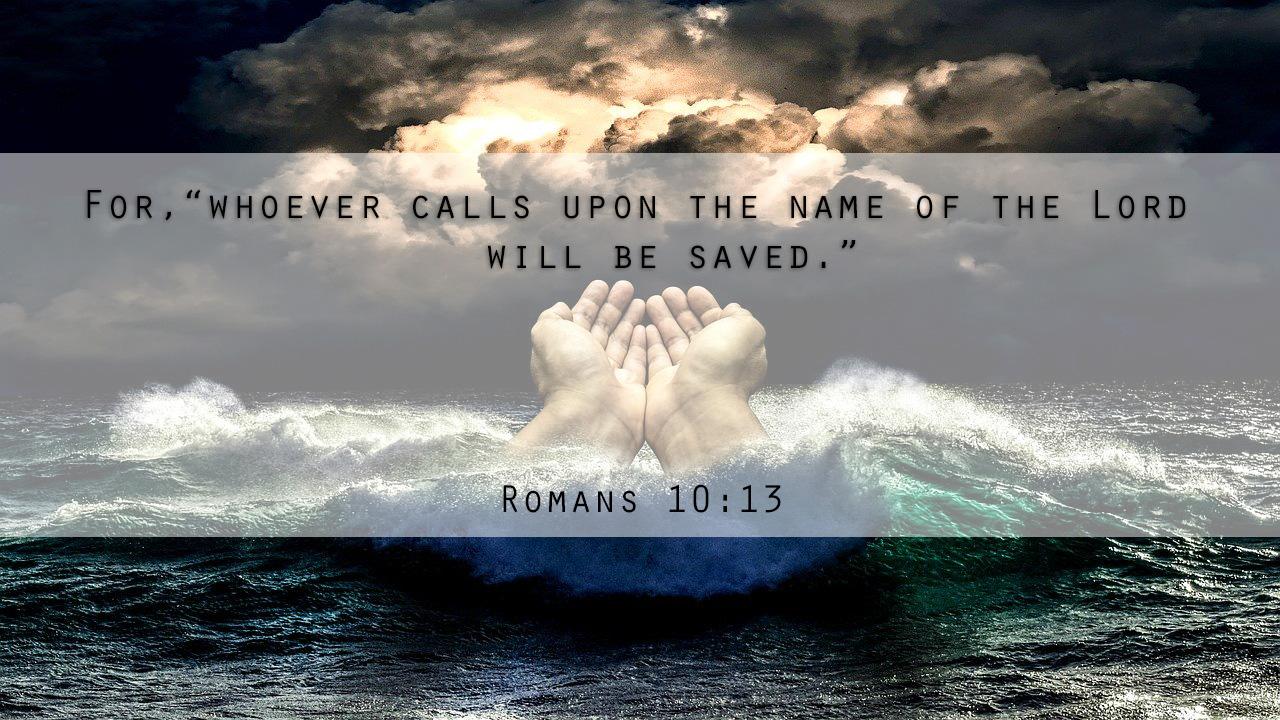
Is Jesus Called YHWH in Romans 10:13?
Is Jesus Called YHWH in Romans 10:13?
In Romans 10:13, the apostle Paul reached the summit of a brilliant discourse on salvation by citing Joel 2:32 in the Greek Septuagint: “For, ‘everyone who calls upon the name of the Lord will be saved.’” Although the Septuagint substitutes the title “Lord” for God’s personal name, Paul was doubtless aware that the original Hebrew instructs people to “call upon the name of YHWH” for salvation.
Nevertheless, he embedded this quotation in a discourse about salvation through Jesus. Was he therefore applying Joel 2:32 directly to Jesus? And if so, does it mean he thought Jesus was YHWH? Dr. David Capes argues that verses like Romans 10:13 in fact provide “the raw materials” for the Trinitarian doctrinal developments of later church councils.1
In The Divine Christ: Paul, Jesus, and the Scriptures of Israel, Capes offers four reasons to think Paul not only applies Joel 2:32 to Jesus, but is therefore identifying Jesus with YHWH in a “proto-Trinitarian” way.2 But just how well do these reasons hold up under scrutiny? We will evaluate each of them below.
Reason #1: Paul Shifts From Theocentric to Christocentric

Capes highlights two OT passages that are originally about YHWH yet are applied to Jesus in the verses leading up to Romans 10:13. In his opinion, this is our first indication that Paul is identifying Jesus with YHWH in an unusual way.
a. Romans 9:33 (citing Is. 8:14 & Is. 28:16)
Romans 9:33 (ESV) — As it is written, ‘Behold, I am laying in Zion a stone of stumbling, and a rock of offense; and whoever believes in him will not be put to shame.’
Here Paul combines Is. 8:14 and Is. 28:16 into one midrashic statement, indicating that the “stone of stumbling and rock of offense” (8:14) and the cornerstone “laid in Zion” (28:16) are both the same stone. In Is. 8:13-14 this stone is identified as YHWH, but Paul appears to identify it as Jesus. Capes therefore contends:
Paul takes Isaiah’s oracle describing YHWH as the stumbling stone for both houses of Israel and transfers the words to Christ. He apparently has concluded that prophetic statements about Israel’s God can appropriately be used to described the crucified and risen Messiah.3
Allegedly, Paul has transferred the stumbling stone metaphor from YHWH to Christ. This assumed shift in focus is taken by Capes as a hint that Jesus is YHWH. However, such a hint would be at odds with the consistent distinction Paul makes between Jesus and God throughout his letter.4
Is Paul really making the innovative theological move that Capes suggests? Not according to the full context of the OT passage in view. The remainder of Isaiah’s oracle goes on to describe Israel’s stumbling, and here we learn that Israel will actually stumble over two individuals – YHWH and his appointed Messianic King (cp. Heb. 2:13):
Isaiah 8:18-21 (ESV) — Behold, I (Messiah) and the children whom the LORD [YHWH] has given me are signs and portents in Israel from the LORD [YHWH] of hosts…20 If they will not speak according to this word, it is because they have no dawn. 21 They will pass through the land, greatly distressed and hungry. And when they are hungry, they will be enraged and will speak contemptuously against their king and their God.
In this portion of Isaiah’s stumbling stone oracle, YHWH is depicted as someone other than the Messianic King; in fact, he is portrayed as the Messiah’s God. This precludes the idea that YHWH and his Messiah have somehow merged identities via the stumbling stone.
Israel stumbles over YHWH and his appointed Messianic king not because they are both the same individual, but for the simple reason that YHWH is working through the Messiah. To stumble over the Messiah is also by necessity to stumble over the Messiah’s God, YHWH, who sent him.
Moreover, Paul’s application of Isaiah 8:14 to Jesus is a prime example of the well-established Jewish principle of agency whereby something done to one’s duly appointed agent (i.e. the Messiah) is regarded as if it had been done to the one who sent him (i.e. God).5
b. Romans 10:6-8 (citing Deut. 30:11-14)
Romans 10:6-8 (ESV) — But the righteousness based on faith says, “Do not say in your heart, ‘Who will ascend into heaven?'” (that is, to bring Christ down) “or ‘Who will descend into the abyss?'” (that is, to bring Christ up from the dead). But what does it say? “The word is near you, in your mouth and in your heart” (that is, the word of faith that we proclaim)…
In this allusion to Deut. 30:11-14, Capes urges that “to bring Christ down” in Rom. 10:6 is “a likely reference to what is later called the incarnation.” 6 His theory depends on the order of the two actions mentioned – first Paul warns against bringing Christ down from heaven, and then he warns against bringing Christ up from the dead.
Capes appears to assume that Paul’s warning corresponds to two sequential events, such that the first warning refers to a pre-existent Jesus residing in heaven. The problem with such an assumption is that the entire passage is actually focused upon the ascended Jesus residing in heaven.
We even find an implicit parallel between the ascending/descending motif in vss. 6-8 and the confession of faith in vs. 9: No one should try to ascend to heaven (vss. 6-8) but should believe in faith that Jesus ascended to heaven as exalted Lord (vs. 9), and no one should attempt to descend to the grave (vss. 6-8) but should believe in faith that Jesus descended to the grave and was raised again by God (vs. 9).
Furthermore, the declaration of faith in vs. 9 reverses the actual sequence of events. Paul first describes the exaltation of Jesus as Lord followed by his crucifixion and resurrection, rather than the actual sequence of crucifixion followed by resurrection and exaltation. Similarly, we are called to confess with our mouth and then believe with our heart, rather than the normal sequence of first believing and then confessing. Leon Morris explains the probable reason:
Paul proceeds to speak of confessing and believing. We would have expected the reverse order, but we should probably not make too much of this. The two are in the order of “mouth” and “heart” in the passage Paul has just quoted [Deut. 30:11-14], and he goes on to put them in the order we would expect (v. 10).7
The sequence in Rom. 10:9 is most likely reversed in order to mirror the ascending/descending motif mentioned in Rom. 10:6-8. This, in turn, indicates that Paul is talking about bringing down the ascended Christ.
| Romans 10:6-8 (ESV) | Romans 10:9 (ESV) |
| 6 But the righteousness based on faith says, “Do not say in your heart, ‘Who will ascend into heaven?'” (that is, to bring Christ down) 7 “or ‘Who will descend into the abyss?'” (that is, to bring Christ up from the dead). 8 But what does it say? “The word is near you, in your mouth and in your heart” (that is, the word of faith that we proclaim); | 9 because, if you confess with your mouth that Jesus is Lord [because he ascended into heaven] and believe in your heart that God raised him from the dead [after he descended to the grave], you will be saved. |
Paul’s warning in vss. 6-8 highlights the need for a faith in the death, resurrection, and ascension of Jesus that is based upon verbal testimony rather than visual proof.8 Though most Jews had not personally observed Christ’s ascension or resurrection, they had the eyewitness accounts of the apostles, who brought them the word of God regarding salvation through Christ (Rom. 10:8). The Jews were therefore to believe in faith that God had accomplished what David prophesied in Ps. 110:
Acts 2:34-36 (ESV) — For David did not ascend into the heavens, but he himself says, “‘The Lord said to my Lord, “Sit at my right hand, until I make your enemies your footstool.”‘ Let all the house of Israel therefore know for certain that God has made him both Lord and Christ, this Jesus whom you crucified.”
Reason #2: Paul Focuses Upon the Resurrection

Capes highlights Paul’s emphasis on the resurrection in Romans 10 as evidence that Joel 2:32 is being applied to Christ. This is because the title “Lord” was officially given to Jesus at his resurrection, and the same title is also used in Joel 2:32 (LXX):
Paul thinks that the title kyrios [Lord] now belongs to Jesus on the basis of the resurrection (Rom. 1:3-4; Phil. 2:9-11), and resurrection is frequently associated with the title. Therefore, the resurrection emphasis in this passage also makes it likely Paul applies this YHWH text [Joel 2:32] to Jesus.9
Capes correctly points out that Paul has applied the title “Lord” (kyrios) to Jesus in places like Rom. 10:9. However, the “Lord” in Joel 2:32 LXX – which Paul cites in Rom. 10:13 – has an added layer of meaning in that it is a substitution for the proper name YHWH that appears in the original Hebrew.
Capes appears to presume that the title “Lord” as applied to Jesus also represents the proper name YHWH. But common sense tells us that even if two individuals share the same title they still do not share the same identity. This becomes apparent when we examine the background of a key citation found just a few chapters earlier in Rom. 8:34:
“Jesus is the one who died – more than that, who was raised – who is at the right hand of God.” This is a direct allusion to Ps. 110:1, which says: “The LORD says to my Lord: ‘Sit at my right hand, until I make your enemies your footstool.’”
Here we find two distinct “Lords” — the Lord God seats a second Lord at his right hand. The first LORD is actually “YHWH” in the Hebrew, while the second Lord is “adoni,” a word used exclusively of non-divine Lords throughout the Hebrew scriptures. Dr. Claude Mariottini confirms that “[t]he word translated ‘lord’ is ‘adoni’ and should be translated ‘my lord.’ The word is not ‘Adonai’ which, if it had been used, would be a reference to God.” 10 Moreover, the NET Bible commentary says of this verse:
In the psalm’s original context the speaker is an unidentified prophetic voice in the royal court. In the course of time the psalm is applied to each successive king in the dynasty and ultimately to the ideal Davidic king. NT references to the psalm understand David to be speaking about his “lord,” the Messiah. (See Matt 22:43-45; Mark 12:36-37; Luke 20:42-44; Acts 2:34-35).11
Capes’ assessment conflates the two Lords of Psalm 110, even though passages like Rom. 8:34 and Rom. 15:6 confirm that only one of these two Lords is YHWH. Romans 8:34 states that Jesus is at the right hand of God. Romans 15:6 tells us that this same God is “the God…of our Lord Jesus Christ.” Thus Paul recognizes the first LORD (YHWH) in Ps. 110:1 as the God of the second Lord (Jesus) in Ps. 110:1. By this it is clear that he does not think YHWH and the resurrected Jesus are the same Lord.
Reason #3: Paul Focuses Upon the Eschatological Aspect of Salvation

Capes points out that Paul tends to apply the title “Lord” to Jesus when discussing eschatological matters like those found in Rom. 10:13. And we agree that this could suggest Rom. 10:13 refers at least in part to Jesus. But Capes problematically attempts to draw support from Joel 2:31, which refers to the eschatological “day of the LORD [YHWH]”
Paul appears to have Joel 2:31 in view when he describes the return of Christ in 1 Cor. 1:8, leading Capes to observe that “for the apostle [Paul], Joel’s ‘day of the Lord’ has become the ‘day of our Lord Jesus Christ’ (1 Cor. 1:8).”12 Once again, Capes implies that Paul has switched the focus from YHWH to Jesus, this time by applying Joel 2:31 to Jesus in 1 Cor. 1:8. It seems he would like us to assume that two individuals who share the same day must also share the same identity. But this is simply a non sequitur.
We have noted previously that Paul was operating within the Christological framework laid out Psalm 110. This Psalm mentions two “Lords” involved in the eschatological day of wrath, but only one of them is YHWH. The other “Lord” is YHWH’s chosen Messiah, the one through whom he will execute that wrath:
Psalm 110:2-5 (ESV) — 2 The LORD [YHWH] sends forth from Zion your (Messiah’s) mighty scepter. Rule in the midst of your enemies! 3 Your people will offer themselves freely on the day of your (Messiah’s) power, in holy garments; from the womb of the morning, the dew of your youth will be yours…5 The Lord (YHWH) is at your (Messiah’s) right hand; he (YHWH) will shatter kings on the day of his (YHWH’s) wrath.
The day of YHWH’s wrath is also the day of the Messiah’s power, not because the Messiah is YHWH but because YHWH will empower the Messiah to execute his wrath (see also Rev. 6:16-17). There is no confusion of identities in this passage; the Messiah is clearly depicted as the human agent of his God YHWH.
This dispels any notion that Paul has somehow collapsed the two figures into one. To the contrary, the “day of our Lord Jesus Christ” in 1 Cor. 1:8 identifies Jesus as the prophesied Messianic agent through whom YHWH would mete out justice on the day of judgment.
Reason #4: Paul States that “Jesus is Lord” in Romans 10:9

Here we arrive at the real meat of Capes’ four-part argument. He considers the Christological confession in Romans 10:9 to be the deal-clincher that should convince the reader of his claims, even if his previous three points failed to do so:
[In Romans 10:9] the apostle characterizes his gospel and believers’ appropriate response to its proclamation by the confession “Jesus is Lord.” [In Romans 10:13] he proceeds to quote Joel 2:32: “For everyone who calls on the name of the Lord [kyrios] shall be saved.” The internal logic of the passage requires that the one who is confessed as Lord is the same Lord called upon by everyone to be saved. 13
This parallel carries weight and should be considered carefully. Romans 10:9 and 10:13 both mention a confession that involves the word “Lord” and results in salvation. Further, 1 Cor. 1:2 mentions believers who “call on the name” (epikaleo ho onoma) of Jesus – the same Greek phrase that is used in Joel 2:32 LXX and Rom. 10:13.
It seems clear, then, that Paul’s use of Joel 2:32 in Rom. 10:13 has Jesus in view. But does it have Jesus alone in view? This is Capes’ premise. He argues that “Paul apparently had no qualms about shifting his focus from God to Christ. . . when quoting texts containing the divine name.” 14
Yet Paul’s letter to the Romans consistently makes the case that there are two distinct figures involved in the salvation he preached: God and his Messiah.15 The interaction of these two figures in the drama of salvation is nowhere more evident than in Rom. 10:9, which Capes rightly places in parallel to Rom. 10:13:
| Romans 10:9 (ESV) | Romans 10:13 (ESV) |
| because, if you confess with your mouth that Jesus is Lord and believe in your heart that God raised [Jesus] from the dead, you will be saved. | For “everyone who calls on the name of the Lord will be saved.” |
To “call upon the name of the Lord” for salvation is not merely to speak the name of an individual, as one might suppose if Rom. 10:13 is taken in isolation. Romans 10:9 makes it clear that eschatological salvation is obtained by confessing and believing that God raised Jesus from the dead and made him Lord. In other words, Rom. 10:9 is the full expression of Paul’s point, while Rom. 10:13 is an abbreviated version.
This argues against the popular supposition that Paul has shifted the focus from God to Christ in Rom. 10:13 via the word “Lord.” Both figures are actually in view, and they are assuredly not the same “Lord”: one raised the other from the dead (Rom. 10:9), and the one who did the raising is God over the one who was raised (Rom. 15:6).
In other words, the Lord God permanently bestowed a representative Lordship upon his human Messianic Son at the resurrection, such that the Lord Jesus represents the Lord God and functions on his behalf. This position expressed by Paul in Romans 8:34 and 10:9 allows him to later cite Joel 2:32 without concern that his reader might imagine a subtle attempt to identify Jesus as a second YHWH. Such an attempt would indeed be nonsensical to a first century hearer and certainly require further explanation that is nowhere to be found.
Moreover, the resurrected Lordship of Jesus mentioned in Rom. 10:9, as noted earlier, is rooted in Psalm 110:1. There we find two Lords mentioned such that the first Lord (YHWH) is the God of the second Lord (Jesus). Significantly, Peter made a connection between Psalm 110 and Joel 2 at Pentecost.
In Acts 2, Peter quotes Joel 2:28-32 verbatim and tells us that the outpouring of the spirit was triggered by Jesus’ exaltation to the right hand of God (Ps. 110:1). We may be baptized in Jesus’ name for salvation, he explains, expressly because “God has made him both Lord and Christ, this Jesus whom you crucified.” (Acts 2:36) Thus Peter’s interpretation of Joel 2:32 distinguishes Jesus from God and identifies Jesus’ lordship as something bestowed upon him by God.
Paul likewise instructs us to call upon YHWH for salvation by confessing Jesus as the one whom YHWH has resurrected and exalted as Lord in Rom. 10:9-13. One cannot acknowledge Jesus as Lord without also acknowledging his God YHWH, who put him in that position to begin with. This is explained in Rom. 10:9 and therefore need not be repeated in Rom. 10:13.
The theology behind Paul’s use of Joel 2:32 is rooted in a key principle regarding God’s salvation that is evident throughout the OT: one can simultaneously attribute salvation to YHWH and to an intermediary figure appointed by YHWH, without nonsensically implying that the second figure must be YHWH. This is because YHWH is simply working through the second figure. A good example is found in 1 Samuel:
| 1 Samuel 7:8 (ESV) | 1 Samuel 9:16 (ESV) |
| And the people of Israel said to Samuel, “Do not cease to cry out to the LORD [YHWH] our God for us, that he may save us from the hand of the Philistines.“ | “Tomorrow about this time I [YHWH] will send to you a man from the land of Benjamin, and you shall anoint him to be prince over my people Israel. He shall save my people from the hand of the Philistines. For I have seen my people, because their cry has come to me.” |
Just as 1 Samuel attributes salvation both to YHWH and to the man from the land of Benjamin whom YHWH had sent, so also salvation can be attributed to Jesus and God in Romans 10 without conflating the two. Indeed, this is precisely the point in Rev. 7:10: “Salvation belongs to our God who sits on the throne, and to the Lamb!”
This principle brings Romans 10:13 into harmony with the wider Biblical narrative about the salvation of YHWH – a narrative whose central premise is that God would first extend his salvation to the Messiah and then establish him as agent of that salvation for the rest of mankind.16
Moreover, Jesus was the first to experience the salvation described in Joel 2:32 when he called upon the name of YHWH (someone other than himself) and was subsequently saved at his resurrection. This is powerfully depicted in the Psalm Jesus quoted while hanging on the cross:
| Psalm 31:7, 16-17 LXX (Brenton) | Joel 2:32 LXX (Brenton) |
| Into thine hands I will commit my spirit: thou hast redeemed me, O Lord God of truth. . . . Make thy face to shine upon thy servant: save [sodezo] me in thy mercy. O Lord [Heb=YHWH], let me not be ashamed, for I have called upon [epikaleomai] thee: let the ungodly be ashamed, and brought down to Hades. | And it shall come to pass that whosoever shall call on [epikaleomai] the name of the Lord [Heb=YHWH] shall be saved [sodezo]: for in mount Sion and in Jerusalem shall the saved one be as the Lord has said, and they that have glad tidings preached to them, whom the Lord has called. |
In sum, while the confession in Rom. 10:9 does suggest that Paul is applying Joel 2:32 to Christ, it also confirms that Christ is not the only one in view. YHWH is the additional and superior figure in the picture, portrayed as the one who saved Christ before establishing him as the agent of our salvation. Paul’s theology in Rom. 10:9-13 is thus at odds with Capes’ speculative interpretation of Romans 10:13.
Conclusion
In this article we have reviewed all four elements of David Capes’ argument and discovered a few solid points that were unfortunately outnumbered by a host of unconvincing ones. On the positive side, the claim that Rom. 10:13 applies Joel 2:32 to Jesus was particularly well supported by the fourth element of his case. We can therefore agree with Capes on this much.
However, the idea that such an application identifies Jesus with YHWH in a proto-Trinitarian sense utterly fails to convince. Our investigation has shown that Paul’s view of salvation in Rom. 10:9-13 – in harmony with the wider Biblical narrative – involves two figures, only one of whom is YHWH.
Indeed, each text Capes attempts to leverage in favor of his premise is better understood within the theological framework established by Psalm 110, which depicts YHWH seating a human being at his right hand to act as his agent in accomplishing the salvation of mankind.
- David Capes, The Divine Christ: Paul, Jesus, and the Scriptures of Israel, p. 186. ↵
- Capes shies away from actually stating that Paul is identifying Jesus as YHWH, presumably because he is aware of the logical pitfall of conflating Jesus and YHWH as numerically identical. Thus he prefers to ambiguously frame it as Paul identifying Jesus with YHWH in an unexpected, “proto-Trinitarian” sort of way. ↵
- Divine Christ, p. 112. ↵
- E.g. Rom. 1:7-8, 3:24-25, 5:10-11, 8:17, 10:9, 15:5-7. Although Capes cites Romans 9:5 several times in his book as evidence that Jesus is called “God” in Romans, he fails to acknowledge the well-known grammatical ambiguity of this verse in the Greek. While some translations render it like the ESV (“To them belong the patriarchs, and from their race, according to the flesh, is the Christ, who is God over all, blessed forever. Amen”), other translations render it similar to the KJV (“Whose are the fathers, and of whom as concerning the flesh Christ came, who is over all, God blessed for ever. Amen”). For a thorough analysis of the textual and theological considerations, see here and here. ↵
- For more on the principle of agency, see Shaliach: An Introduction to the Law of Agency. ↵
- Divine Christ, p. 114. Brackets mine. ↵
- See Leon Morris, The Epistle to the Romans (Pillar New Testment Commentary), under Romans 10. ↵
- It also may well anticipate the activity of the wicked human ruler depicted in Isaiah 14:13: “You said in your heart, ‘I will ascend to heaven; above the stars of God I will set my throne on high. . .” While some early church fathers took this as the fall of Satan, many later theologians have pointed out that the context doesn’t support such a conclusion, since the passage is clearly about human pride. (See, e.g., John Oswalt, The Book of Isaiah Chapters 1-39, p. 320.) ↵
- Divine Christ, p. 115. Brackets mine. ↵
- See https://claudemariottini.com/2012/08/21/the-lord-said-to-my-lord/ ↵
- See http://classic.net.bible.org/verse.php?book=Psa&chapter=110&verse=1 ↵
- Divine Christ, p. 115 ↵
- p. 116. ↵
- p. 117 ↵
- Rom. 1:9, 16-17; 5:1-2, 8-10; 6:4, 11-14, 22-23; 7:25; 8:3-4, 11; 9:33; 10:1-9 ↵
- See, e.g., Is. 49:7-8, Heb. 5:7-10. ↵